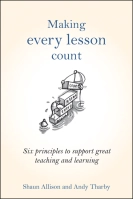The 15 minute forum tonight was led by yours truly. As Y11 begin the final countdown from mock exams to the their final exams in the summer, Andy Tharby and I have been reviewing the resources and guidance that we give them, to support their revision. Over the years this has accumulated into a large booklet full of revision ‘advice’. The problem is that this booklet has become far too big and contains too many techniques and so ends up adding to their confusion! Furthermore, many of the techniques are questionable. So, we looked to the paper above (download here) to gain some clarity.
In the paper, Dunlosky et al identify the most effective techniques to support learning, that could be used for revision. Before this though, they also identify some common revision techniques that have been shown to have very little effect on learning.
Three commonly used revision techniques that appear to have very little impact on learning were:
- Highlighting texts
- Re-reading
- Summarising text
The reason these are so ineffective, is that they require very little cognitive work…and it’s cognitive work i.e. thinking about things, that makes us remember things. It’s easy to see why are they are popular with students though. They are very low demand, make the students feel as if they are ‘doing revision’ and for highlighting and summarising, there is a product for their efforts. They can come bounding downstairs from their bedroom and show mum/dad highlighted sheets of text of revision that they have ‘done’. Gratifying? yes. effective? No.
So having established what doesn’t work, we then explored 5 techniques that appear to work well and make a difference to learning.
1. Practice Testing
This technique is pretty straightforward – students keep testing themselves (or each other) on what they have got to learn. This technique has been shown to have the highest impact in terms of supporting student learning. Some ways in which students can do this easily:
- Create some flashcards, with questions on one side and answers on the other – and keep testing yourself.
- Work through past exam papers – many can be acquired through exam board websites.
- Simply quiz each other (or yourself) on key bits of information.
- Create ‘fill the gap’ exercises for you and a friend to complete.
- Create multiple choice quizzes for friends to complete.
2. Distributed Practice
Rather than cramming all of their revision for each subject into one block, it’s better to space it out – from now, through to the exams. Why is this better? Bizarrely, because it gives them some forgetting time. This means that when they come back to it a few weeks later, they will have to think harder, which actually helps them to remember it. Furthermore, the more frequently you come back to a topic, the better you remember it.
 The graph above demonstrates this, by returning to a topic and reviewing it, you remember it for longer.
The graph above demonstrates this, by returning to a topic and reviewing it, you remember it for longer.
3. Elaborate Interrogation
One of the best things that students can do (either to themselves or with a friend) to support their revision is to ask why an idea or concept is true – and then answer that why question. For example;
- In science, increasing the temperature can increase the rate of a chemical reaction….why?
- In geography, the leisure industry in British seaside towns like Barry Island in South Wales has deteriorated in the last 4 decades….why?
- In history, in 1929 the American stock exchange collapsed. This supported Hitler’s rise to power….why?
So, rather than just trying to learn facts or ideas by reading them over and over, students should get into the habit of asking themselves why these things are true.
4. Self Explanation
Rather than looking at different topics from a subject in isolation, students should try to think about how this new information is related to what they know already. This is where mind- maps might come in useful – but the process of producing the mind map, is probably more useful than the finished product (not convinced about the focus put on colours, shape of branches etc.). So, they should think about a key central idea (the middle of the mind map) and then how new material, builds on the existing knowledge in the middle.
Alongside this, when they are solving a problem e.g. in maths, they should explain to someone the steps they took to solve the problem.
5. Interleaved Practice
When students are revising a subject, the temptation is to do it in ‘blocks’ of topics. Like below:
The problem with this is, is that it doesn’t support the importance of repetition – which is so important to learning. So rather than revising in ‘topic blocks’ it’s better to chunk these topics up in their revision programme and interleave them:
In summary
This quote from Daniel Willingham pretty much sums up the process of learning – we remember things when we have to think about them. So when supporting students with revision we should be doing more of the following:
- Testing.
- Spacing it out.
- Keep asking ‘why’?
- Building on what they know.
- Getting them to explain their steps in problem solving.
These revision strategies will be shared with Y11 students during an assembly after half term. The hope is that if students and staff are discussing and using the same techniques, that have been shown to work, we’ll have a common language to use in terms of revision. Furthermore, by telling students that these techniques have a track record of success, we will hopefully reduce some of their anxieties around revision and exams.
Resources















Thanks for this Shaun.
I’m a great believer in the asking ‘WHY’ technique to provoke thinking about the answer and how it relates. This turns the answer in to an ‘open’ answer rather than just a ‘closed’ response. .Debbie
Reblogged this on The Echo Chamber.
Nice to see common sense. Good.
Shared this with my year 11 Geographers and will discuss with year leaders and SLT tomorrow, revisiting after forgetting helps to really embed learning. Many thanks.
Reblogged this on Education Web Gems.
Reblogged this on David J Terrell and commented:
I’d like to reblog this because we are under constant pressure to reduce the time we spend teaching a particular subject.
We ask our students to cover it in custard – when revising applying an acronym to structure answers. An exam technique developed in revision.
Reblogged this on petersugden.
I found this really helpful. I have a revision display in my lab that mentions many of the points that you have raised. The ‘Why’ technique reminds me of the ‘so what’ technique that my geography teacher used in class and I find myself repeating to students now. I will share this with my colleagues.
Pingback: A Night of Revision | Essential Teaching and Learning
Pingback: Revision tips | Geography is easy
Pingback: Elaborate Interrogation | Purple Pedagogy
I used this today in a Yr11 assembly on revision. I created a Prezi from your Powerpoint suggestion using a desk as the background template (I hope that you don’t mind(?) – I have shared the link below but you need to join Prezi to access). Students were very engaged and it worked a treat. I also used your word document as a revision guidance booklet (with a few tweaks) for our students to use. School leaders thought that it could have a great positive impact with our students. Many thanks for sharing these 2 fantastic, high quality resources. I have found them great to use and students have really seemed to value them.
Prezi link:http://prezi.com/mmavvxwr0trk/?utm_campaign=share&utm_medium=copy&rc=ex0share
PS – I found the research paper a very interesting read too.
Pingback: Shuffle Your Sums! Growing Mathematical Mind-Sets. | Meols Cop High School
Pingback: How I do revision… | Class Teaching
Pingback: Getting revision right | Teaching: Leading Learning
Pingback: Revision… – @ASTSupportaali | NewToThePost
Pingback: GCSE Revision Lessons | North Devon MFL
Pingback: GCSE Revision Lessons | Everyday MFL
Sounds like my revision practice in 1975 when I was 12
Pingback: What to do with Y11? | Class Teaching
Reblogged this on rhyddings revision and commented:
Whilst this blog post with various revision techniques was written for teachers to use, the strategies are explained in enough detail that students can use the techniques in your own revision.
Pingback: How to revise: techniques that work | The Headteacher's Blog
Pingback: Five strategies for encouraging more effective independent study | must do better…
Pingback: Journal Club | ndhsblogspot
Pingback: Quizlet – an interactive memory recall tool | Class Teaching
Pingback: Successful Revision Strategies | Learning Matters
Pingback: Workload Matters | Class Teaching
Pingback: Everyday Revision | Everyday MFL